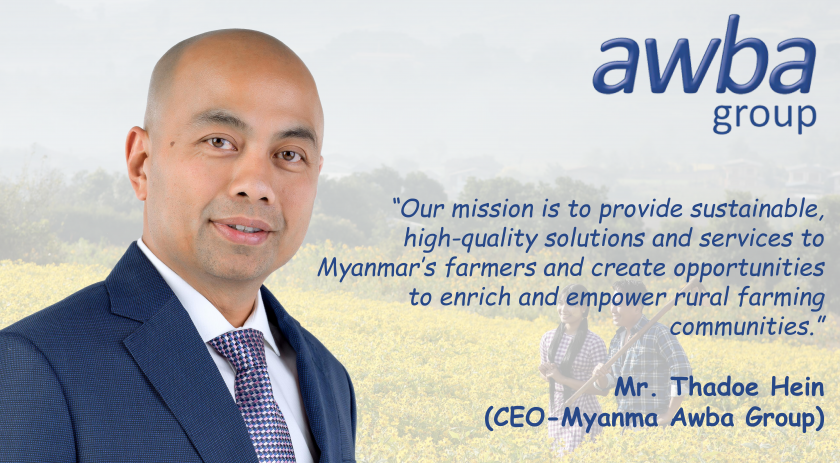
Introduction and Role: Could you introduce yourself to our readers and describe your role at Myanma Awba? How do your responsibilities align with the company’s mission and vision?
"Certainly. I am Thadoe Hein, the CEO of Myanma Awba Group. As CEO, I oversee the company's strategic direction and overall operations. I work closely with our leadership team to ensure our actions and decisions align with the company's mission and vision. My responsibilities involve fostering a culture of innovation, sustainability, and growth while upholding our commitment to serving the needs of our customers and communities."
Vision, Mission, and Impact: Can you provide insight into Myanma Awba’s founding principles and its overarching goals for the future? Can you share specific examples of the impact Myanma Awba has had on local farmers and communities?
“Myanma Awba is founded on empowering farmers and driving sustainable agricultural development in Myanmar. Our vision is to become the leading provider of innovative solutions that enhance agricultural productivity and improve livelihoods across the country. Our mission is to provide sustainable, high-quality solutions and services to Myanmar's farmers and create opportunities to enrich and empower rural farming communities. Over the years, we have made significant strides in fulfilling this vision by engaging proactively with our stakeholders. We have positively impacted local farmers for example, We developed 46 new products since October 2022. We aim to minimize our operations' environmental footprint and reduce our activities' impacts.
The past four years have been very challenging for farmers due to rising fertilizer costs, supply conditions and other situations. We have been working hard to deliver fertilizers at the lowest possible price and on time so that farmers can continue to grow crops for the domestic food security.”
Offerings and Innovation: What are the main products and services that Myanma Awba offers to its customers? Can you discuss any innovative technologies or practices introduced by Myanma Awba to support farmers?
"At Myanma Awba, we offer a comprehensive range of products and services designed to meet the diverse needs of our customers. This includes application and processing of 114,000+ metric tons raw materials. We are committed to innovation and have introduced several pioneering technologies and practices to support farmers. For instance, 40 product development experts are currently working to develop new formulas. We also have dedicated land where we test our products and use technology to optimize yields and productivity. These innovations improve productivity and promote sustainability and resilience in agriculture."
Quality Assurance and Challenges: How does Myanma Awba ensure the highest standards of quality in its products and services? Could you share a significant challenge that Myanma Awba has faced and how it was overcome?
"Ensuring the highest standards of quality is central to our operations at Myanma Awba. We have robust quality assurance processes in place. To ensure the quality of our services, we carefully track and record the complaints submitted by our distributors and their customers, such as the farmers. Last year, we recorded 114 complaints from the distributors: 37% pertained to logistics issues and 37% to the quality of our packaging.”
Strategic Differentiation: As a member of FMCCI, how do you plan to leverage this association to benefit the agricultural industry in Myanmar? Are there specific initiatives with FMCCI that could enhance the visibility of the agricultural sector?
“As a member of FMCCI, we recognize the importance of collaboration and collective action in advancing the agricultural industry in Myanmar especially during the time of great challenges.”
Future Outlook and Upcoming Initiatives: What role does Myanma Awba envision for itself in shaping the future of Myanmar’s agricultural sector? Are there any upcoming
“Looking ahead, Myanma Awba envisions itself playing a pivotal role in shaping the future of Myanmar's agricultural sector. We are committed to driving innovation, promoting sustainability, and empowering farmers to thrive in a rapidly changing landscape. To reduce the environmental impacts of our products, we invest in developing new products such as organic fertilizers. We are also exploring projects to promote a more circular agri-food chain.
The current political climate has imposed many great challenges and roadblocks in the agriculture sector. Such as access to credit, rising input prices, and barriers to importation. Therefore, we believe that more circular agri-food chain approach will provide a positive impact on farming communities with locally produced organic fertilizers”












